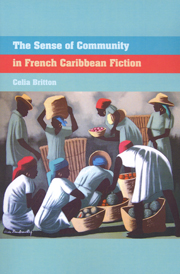Book contents
- Frontmatter
- Contents
- Acknowledgements
- Abbreviations
- Introduction
- 1 Restoring Lost Unity in Jacques Roumain's Gouverneurs de la rosée
- 2 Past, Future and the Maroon Community in Edouard Glissant's Le Quatrième Siècle
- 3 Living by Mistake: Individual and Community in Simone Schwarz-Bart's Pluie et vent sur Télumée Miracle
- 4 Singular Beings and Political Disorganization in Vincent Placoly's L'Eau-de-mort guildive
- 5 Conquering the Town: Stories and Myth in Patrick Chamoiseau's Texaco
- 6 Community, Nature and Solitude in Daniel Maximin's L'Ile et une nuit
- 7 On Not Belonging: Surrogate Families and Marginalized Communities in Maryse Condé's Desirada
- Conclusion
- Notes
- Bibliography
- Index
7 - On Not Belonging: Surrogate Families and Marginalized Communities in Maryse Condé's Desirada
- Frontmatter
- Contents
- Acknowledgements
- Abbreviations
- Introduction
- 1 Restoring Lost Unity in Jacques Roumain's Gouverneurs de la rosée
- 2 Past, Future and the Maroon Community in Edouard Glissant's Le Quatrième Siècle
- 3 Living by Mistake: Individual and Community in Simone Schwarz-Bart's Pluie et vent sur Télumée Miracle
- 4 Singular Beings and Political Disorganization in Vincent Placoly's L'Eau-de-mort guildive
- 5 Conquering the Town: Stories and Myth in Patrick Chamoiseau's Texaco
- 6 Community, Nature and Solitude in Daniel Maximin's L'Ile et une nuit
- 7 On Not Belonging: Surrogate Families and Marginalized Communities in Maryse Condé's Desirada
- Conclusion
- Notes
- Bibliography
- Index
Summary
In the ten novels which precede Desirada, Condé introduces her readers to a large variety of characters and locations while returning constantly to certain recurrent themes: migration, rootlessness, loss of tradition, oppressive families, women trying to lead autonomous lives in a maledominated world, secrets buried in family history, and misguided attempts to base a personal identity on ethnic or genealogical criteria. Desirada continues to explore these themes, but from a new angle: an opposition between the breakdown of the biological family unit and the contrastingly positive strength of relationships not based on biological kinship: friendship and surrogate parent–child relationships. This opposition is expanded into a contrast between traditional organic communities, of which the family is an essential component, and a far more fluid and amorphous kind of community of people who are, sometimes for economic or political reasons but often because of family breakdown, excluded from the former type – people who ‘don't belong’.
The central character of Desirada is Marie-Noëlle, daughter of Reynalda and grand-daughter of Nina. Reynalda became pregnant with her when she was fifteen and tried to drown herself, but was rescued by Ranélise; a few months after Marie-Noëlle's birth, Reynalda left Guadeloupe for Paris and broke off all contact with her until, twelve years later, she forces Ranélise to send her to Paris to live with her.
- Type
- Chapter
- Information
- The Sense of Community in French Caribbean Fiction , pp. 131 - 150Publisher: Liverpool University PressPrint publication year: 2010

